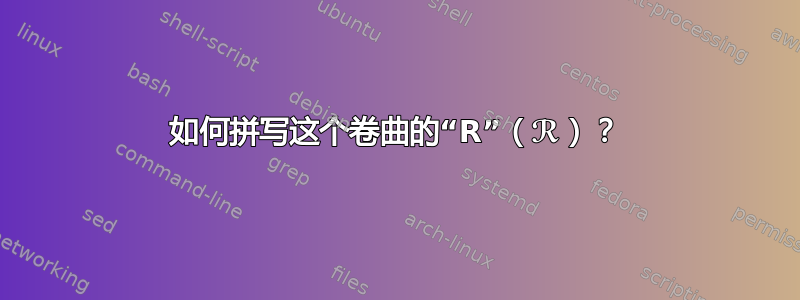
答案1
我的答案是使用 tikz(但使用简单的线条并且不fill添加宽度效果):
\documentclass{article}
\usepackage{amsmath,amsfonts}
\usepackage{tikz}
\usetikzlibrary{}
\newcommand{\fancyR}{\sbox1{\vbox{R}}\sbox2{\hbox{R}}\tikz[inner sep=0pt,outer sep=0pt]{\coordinate (A);\draw[-,black,line width=0.55pt,scale=0.75]([shift={({\the\wd2/2},0)}]A) to[out=180,in=0] ++(-{\the\wd2/2},{3*(\the\ht1+\the\dp1)/5)}) to[in=90,out=180]++({-\the\wd2/5},{-(\the\ht1+\the\dp1)/8})
to[in=270,out=270]++({\the\wd2/2},{7*(\the\ht1+\the\dp1)/12})
to[in=0,out=90]++(-{7*\the\wd2/20},{3*(\the\ht1+\the\dp1)/12})
to[in=90,out=180]++(-{13*\the\wd2/24},-{11*(\the\ht1+\the\dp1)/12})
to[in=180,out=270]++({3*\the\wd2/12},{-4*(\the\ht1+\the\dp1)/10})
to[in=270,out=0]++({11*\the\wd2/48},{(\the\ht1+\the\dp1)/3})
to[in=300,out=90]++(-{3*\the\wd2/13},{11*(\the\ht1+\the\dp1)/12})
to[in=40,out=120]++(-{6*\the\wd2/10},-{1*(\the\ht1+\the\dp1)/6});
}}
\begin{document}
$\mathbb{R}$R\fancyR{}$R$
\end{document}
输出:
答案2
以下是两个不错的 R 选项:
您可以咨询表 307:数学字母表在第 119 页完整列表以获取其他选项。
\documentclass{article}
\usepackage{mathrsfs}
\usepackage{rsfso}
\begin{document}
\begin{tabular}{ll}
$\mathscr{R}$ & \verb`$\mathscr{R}$` with \verb`mathrsfs` package\\
$\mathcal{R}$ & \verb`$\mathcal{R}$` with \verb`rsfso` package
\end{tabular}
\end{document}
答案3
在现代工具链中unicode-math,您可以将任何 TrueType 或 OpenType 字体设置为脚本字母表(或书法字母表或新字母表)。在这个例子中,我将 Adi Marwah 编写的 OTF 版本的 Odelette 下载到了我的项目文件夹的子目录中fonts。
\documentclass[varwidth]{standalone}
\usepackage{unicode-math}
\defaultfontfeatures{Scale = MatchUppercase}
\setmathfont{Latin Modern Math}
\setmathfont[Path = ./fonts/, range = scr]{Odelette.otf}
\begin{document}
\[ \mathscr{R} \subset \mathscr{T} \]
\end{document}
答案4
如果您可以获得高分辨率图像,或者最好是矢量格式的图像,那么这种方法在大多数情况下都适用。但是,它不受诸如\textit、\textcolor等的影响。
\documentclass{article}
\usepackage{scalerel}
\newcommand\fancyR{\scalerel*{\includegraphics{fancyR}}{R}}
\begin{document}
$ab\fancyR c \scriptscriptstyle ab\fancyR c$
$ y = x^{\fancyR}$
$ab\fancyR c \quad\scriptscriptstyle ab\fancyR c$
$x_{\fancyR} = 0$
\end{document}







